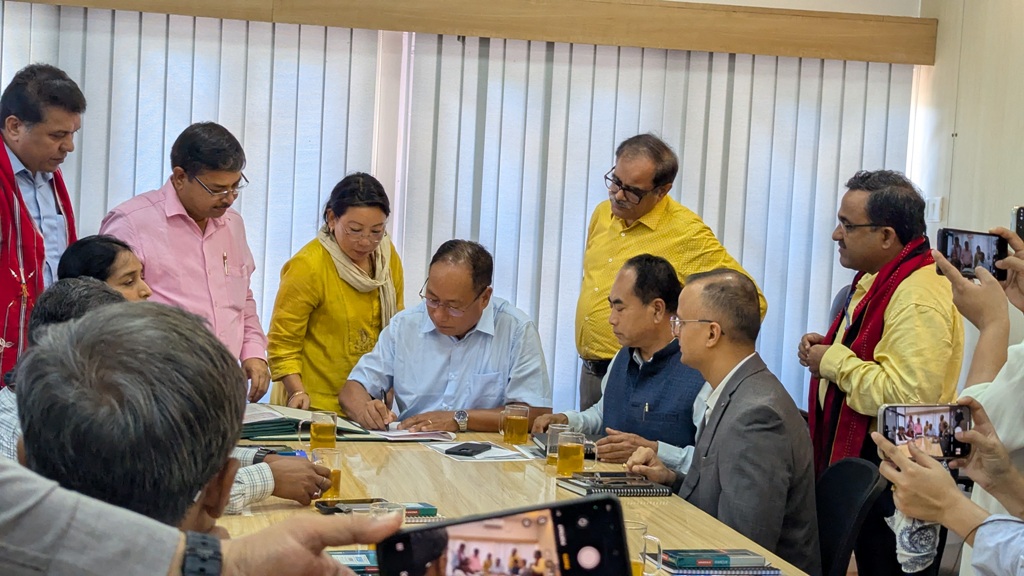Nagaland signs MoU with National Jute Board and partners to boost jute cultivation, farmer income, and sustainable livelihoods across seven districts.
Share

KOHIMA — Nagaland government has entered into a memorandum of understanding (MoU) to promote jute cultivation across seven districts of the state for a period of five years.
The MoU was signed on Friday between the state Agriculture department, the National Jute Board, Jute Corporation of India, and the ICAR–Central Research Institute for Jute and Allied Fibres in Kohima.
Agriculture Production Commissioner (APC) and Mission Director of FOCUS–Nagaland, Wezope Kenye, said that the agreement would help uplift farmers in the state.
He observed that while farmers have been producing jute, the lack of a proper market has remained a major challenge. The MoU, he added, would help address this gap and provide a long-term solution.
Also read: AFSPA extended in parts of Manipur, Nagaland, Arunachal
Kenye pointed out that all stakeholders were present in person at the signing of the agreement, underlining their commitment to promote jute cultivation in Nagaland.
Speaking on the occasion, Shashi Bhushan Singh, Secretary and CEO of the National Jute Board, said that the agreement marked a significant step towards promoting jute cultivation in Nagaland in a big way.
He expressed hope that the initiative would generate additional income for farmers while creating sustainable livelihoods.
He informed that the board, under the agreement, would take care of agronomic practices, introduce modern cultivation methods, train farmers, and promote mechanisation of jute farming.
Singh further stated that the Jute–ICARE scheme of the central government would be implemented in convergence with Nagaland’s National Food Security Mission (NFSM).
Training and farmer support activities will begin immediately to prepare cultivators for the February cropping season, he said, assuring that market linkages would also be arranged.
Joint Secretary (Fibre), Ministry of Textiles, Padmini Singla, underscored that the partnership was designed to promote jute and allied fibres in Nagaland.
She highlighted the state’s rich agro-climatic zones, biodiversity, and resilient farming community—pointing out that jute has immense potential in Nagaland.
According to her, sustainable agriculture and enhanced farmer income can be achieved through such initiatives. She stressed the importance of handholding during the initial stages, saying once farmers experience the benefits, they would independently adopt the crop in subsequent seasons.
Singla added that farmers would be provided with subsidised jute seeds, financial assistance for mechanisation, market linkages, and digital training.
With such support, she expressed confidence that jute could take strong root in the state, making Nagaland a model for the entire Northeast region.
Viwheto Thorie, Joint Director of Agriculture and programme in-charge, informed that demonstration programmes had already been conducted under the National Food Security Mission. The initiative currently covers seven districts—Peren, Chümoukedima, Dimapur, Niuland, Wokha, and parts of Mon and Mokokchung.
Thorie described jute as one of the most promising crops and said the signing of the MoU would enable systematic production and marketing, thereby maximising farmer benefits.
He explained that farmers would be selected based on their capacity and willingness to cultivate. From November to February, in collaboration with the Jute Corporation of India (JCI), awareness campaigns will be carried out, and interested farmers can register with district or sub-divisional agricultural officers.
He informed that Nagaland has about 3,000 hectares under jute cultivation, while JCI records from last year show approximately 3,500 hectares.
Many areas remain unregistered, he added. The crop is mainly grown in the foothills, where warm temperatures and adequate water supply—especially for retting—are essential.
Thorie said that farmers are currently selling raw fibres, which in the past were bought by middlemen at INR 25 to 30 per kg. However, with JCI’s intervention and the introduction of a Minimum Support Price (MSP), farmers have been able to secure better returns.
In 2023, the MSP was INR 40.50 per kg, which has since increased to INR 56.40. This, he said, has significantly benefited farmers by stabilising their income.